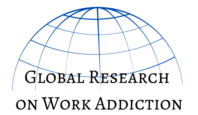Diagnosing work addiction
On this page we discuss how work addiction can be diagnosed, and practical aspects of seeking professional help with it, including whether your health insurance may cover clinical help for compulsive work-related problem.
At present work addiction is not officialy recognized as an addictive disorder in official classifications of diseases and disorders such as DSM 5 by the American Psychiatric Association or ICD 11 by the World Health Organization.
Excessive devotion to work at the expense of family or social relationships is recognized as a symptom of obsessive compulsive personality disorder (OCPD) in the DSM 5. This personality disorder was previously recognized as anankastic personality disorder in the ICD 10, and currently characteriastics of this disorder related to rigid perfectionism and emotional and behavioral constraint are recognized as anankastia domain in disordered personality in the ICD 11. What it practically means is that in many countries you may seek clinical help which may be covered by your medical insurance. This differes from country to country and you may need to consult your local health professionals to learn the exact conditions on which you may seek professional help in your country.
ANANKASTIA IN PERSONALITY DISORDER OR PERSONALITY DIFFICULTY (ICD 11, CODE 6D11.4)
World Health Organization defines anankastia as one of the “Prominent personality traits or patterns” associated with disordered personality:
“The core feature of the Anankastia trait domain is a narrow focus on one’s rigid standard of perfection and of right and wrong, and on controlling one’s own and others’ behaviour and controlling situations to ensure conformity to these standards. Common manifestations of Anankastia, not all of which may be present in a given individual at a given time, include: perfectionism (e.g., concern with social rules, obligations, and norms of right and wrong, scrupulous attention to detail, rigid, systematic, day-to-day routines, hyper-scheduling and planfulness, emphasis on organisation, orderliness, and neatness); and emotional and behavioural constraint (e.g., rigid control over emotional expression, stubbornness and inflexibility, risk-avoidance, perseveration, and deliberativeness).”
WORK ADDICTION AS AN ADDICTIVE DISORDER
However, more and more studies show that work addiction shows important characteristics of an addictive disorder, and its understanding is evolving.
At present, in most countries around the world you cannot be officialy diagnosed with work addiction in the same way as you can be medically diagnosed with depression, anxiety disorder or alcohol use disorder. However, in many contries health institutions and organizations tackling addictive disorders recognize work addiction as an addictive problem. This means that there are health professionals and therapists who can help you with recognition of your problem and its treatment. We provide more information on where to seek help on this web page.
HOW CAN I BE DIAGNOSED?
This will depend to some extent on whether you will seek help from medical institutions, addiction centers, or private counselor or therapist.
Typically you may expect a talk about your problems with a health professional or a therapist. Additionally, some psychological or clinical tests may be performed to evaluate overall psychological functioning, and co-ocurrance of other disorders or health problems. These may include structured or semi-structured interviews, e.g., a comprehensive personality evaluation may be conducted, as well as filling in diagnostic questionnaires.
We especilly recommend:
- consulting health professionals, particularly specializing in addiction-related problems, and
- seeking comprehensive diagnosis, particularly in terms of disorders that co-occur with work addiction.
Previous studies found that work addiction may co-occur with:
- depression,
- anxiety,
- social anxiety,
- obsessive-compulsive personality disorder and other personality disorders (e.g., borderline personality disorder),
- eating disorders (anorexia nervosa, bulimia nervosa),
- other addictive disorders (e.g., alcohol use disorder, food addiction which may be related to binge eating disorder, shopping addiction/compulsive buying),
- bipolar disorder (manic-depressive),
- sleep disorders,
- attention deficit hyperactivity disorder,
- obsessive-compulsive disorder.
If you experience work addiction it does not necessarily mean that you have any of these problems. However, some people struggling with work addiction may additionally suffer from some of them.
Some of these disorders may increase your risk of work addiction (e.g., obsessive compulsive personality disorder), some may be causes as well as results of it (e.g., anxiety or depression), and other may have common causes (e.g., eating disorders). Therefore, addressing and treating these problems may improve your overall functioning, and help you manage your work addiction.
Recognizing other cooccuring mental health problems is very important becuase comorbidity is associated with greater functional impairments (worse functioning in general) and worse health outcomes. It is necessary to address all coexisting problems becuse they may have common causes and they may interact with each other and cause relapses. It is crucial to understand why a person is driven to work excessively, how other problems may contribute to this compulsion to work, and how work addiction may affect other health problems such as depression, anxiety, or insomnia.
